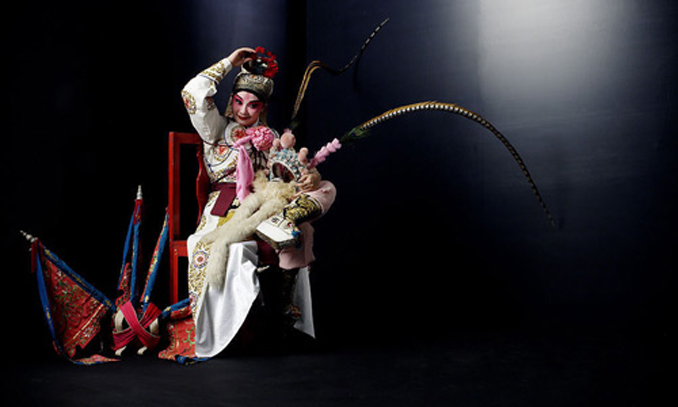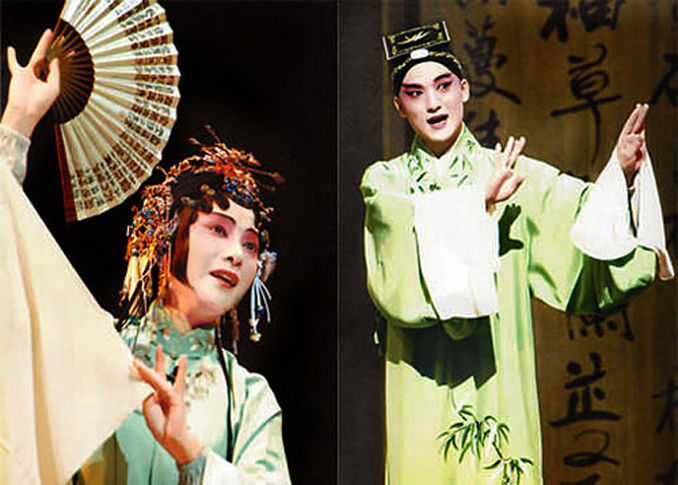
Written by: Tie Mei
Posted on: May 14, 2014 |  | 中文
| 中文
Chinese Kunqu Opera
Chinese Kunqu Opera, the most time-honored form of drama in China to date with a history of over 600 years, is one of the only three ancient drama forms of the world. It has been selected in the UNISCO Intangible Cultural Heritage List 2001, and has in fact made it to the top of the list due to its peculiar cultural value.
Chinese Kunqu Opera, the most time-honored form of drama in China to date with a history of over 600 years, is one of the only three ancient drama forms of the world. It is recognized as a fruit of traditional cultural heritage and a model of dramatic performance with artistic delicacy, profundity and widespread influence. It has been selected in the UNISCO Intangible Cultural Heritage List 2001 for its peculiar cultural value as it represents the highest achievement of classic drama, and it is, perhaps, the last remnants of classical music and a perfect system of dramatic performance.
Kunshan being its place of origin, Chinese Kunqu opera was a popular ballad in Suzhou during the first 200 years in mid 14th century. In the mid 16th century, Wei Liangfu recreated it by making it sound more dulcet. Known as the watermill tune (watermill song), Chinese Kunqu opera became quite popular in Jiangsu and Zhejiang along with the rest of the country. The 18th century saw Chinese Kunqu opera’s prime with widespread great appeal for the masses. It was well received at the court and was in fashion among men of letters and refined scholars. After Emperor Qianlong’s reign in the Qing Dynasty, it came into decline, only to resurge again when People’s Republic of China was founded. Nowadays, performance of Chinese Kunqu opera is popular in Jiangsu, Zhejiang, Shanghai, Peking, Hunan etc..
 |
Recognized as the essence of China’s drama, Chinese Kunqu opera has been esteemed as the representation of elegant art, and is nurtured consistently and conscientiously by the literati and artists. It has been upheld as the national opera, and has been given nicknames such as “mother of operas”and “milk of drama” because it integrates traditional art forms such as music, dance, acrobatics, martial art, recitation and dramatic performance. A number of local operas, including those in Shanxi, Sichuan and Guangdong have evolved from Chinese Kunqu opera.
Firstly, it has promoted the art of drama in terms of displaying a comprehensive mode of engagement involving singing, reciting, acting and playing martial art, and hence has performed the function of being a model for other operas in China. Secondly, details such as on-stage performance and art of singing have been so finely cultivated that practicing well-known texts of Chinese Kunqu opera has become a basic subject in training for potential actors and actresses of other operas. Thirdly, the diversity of Chinese Kunqu opera has made it a significant source for providing stories since the opera form emplys numerous folklores. Famous writers in the past wrote legends by following the format of Chinese Kunqu opera because it was already format of relating stories. A number of plays in Chinese Kunqu opera have become classics, including Peony Pavilion( Mu Dan Ting?, The Palace of Eternal Youth(Chang Sheng Dian )and The Peach Blossom Fan (Tao Hua Shan). As Chinese Kunqu opera inherited the cultural tradition exemplified by the poetry of the Tang Dynasty, Ci of the Song Dynasty and opera and drama of the Yuan Dynasty, its cultural foundation is quite rich. A number of opera writers and musicians, including Tang Xianzu, Hong Sheng and Kong Shangren have become outstanding representatives of Chinese drama in the history of Chinese literature. Thanks to the age-old performances, there numerous plays archived, a few of which include the renowned Peony Pavilion, Dream Under the Southern Bough, Fifteen Strings of Coppers, The Peach Blossom Fan and The Palace of Eternal Youth. Since the middle period of the Qing Dynasty, Chinese Kunqu opera has been performed in the form of scenes. There are more than 400 scenes, including the well-known Peony Pavilion and Broken Bridge.
Chinese Kunqu opera is characterized by suspense, deep characters and wonderful poetic language. For example, The Tale of Pipa is an account of Zhao Wuniang’s miserable life. In the opera, the protagonist herself eats only rice bran but lets her mother-in-law have rice. In “A Song of Filial Piety”, she compares her husband who is to take the imperial examination at the capital to rice and herself rice bran. “Rice bran and rice are companions. Who can imagine that they'd part one day, and then one becomes rich and the other poor, just like my husband and I, who will not see each other again.” Her simile is plain, yet profound.
 |
With innate elegant aesthetic feature, Chinese Kunqu is also enriched by the charms of the literati. Poetry and music are its soul as the lyrics are poetic and the music is tender, touching and alluring. Among the accompanying musical instruments to Chinese Kunqu opera, bamboo flute plays the dominant role and is accompanied by Chinese wind pipe, clarionet, suona trumpet, sanxian (three-stringed musical instrument) and pipa. Delicate performance skills, flying dance moves and adequate stage setting are features of the great achievement of Chinese Kunqu opera has made.
In terms of performing art, Chinese Kunqu opera has helped bring focus to the performances of the actors and actresses since many have done full justice to the characters being displayed . The actors are usually expected to be well grounded and have better cultural upbringing and learn from life so as to be more expressive on stage. Yu Zhenfei, a master Chinese Kunqu opera artist is well informed of classic Chinese literature, calligraphy and painting. Characters such as Li Bai, the famous Chinese poet and Liu Mengmei, the protagonist in Peony Pavilion, played by him are models of excellence.
Drama is a comprehensive manifestation of performing skills such as singing, reciting, acting and playing martial art. Chinese Kunqu opera sets up the highest standard in contras to other forms of drama. An excellent Kunqu performer is expected to excel in all the skills mentioned above so as to perform well on stage. Many actors of other forms of drama take the learning of Kunqu opera as a must in order to improve their skill and artistic cultivation. Mr. Mei Lanfang, the world famous artist of Peking opera spent much time practicing Chinese Kunqu opera.
Ever since its birth, Chinese drama has been active on stage. With the passing of time, it has gone through reform in texts, ways of singing and performing. However, Chinese Kunqu opera has seen little change. Instead, it is eulogized as “live fossil” as it has preserved the features of traditional drama. Its achievements are manifested by the fact that it meets the aspiration and artistic taste of the literati and noble class. The leisurely contented life the literati and noble class enjoyed and their pursuit of the realm of spirit are fully exemplified in Chinese Kunqu opera in its beautiful and idealized atmosphere and its pure artistic taste.
You may also like: